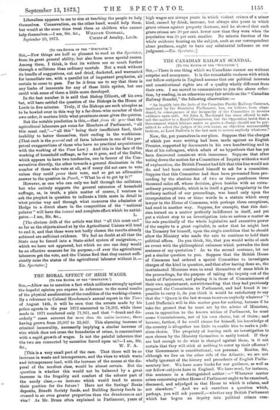THE MORAL EFFECT OF HIGH WAGES.
[TO THE EDITOR OF THE "SPROTATOR."]
SIR,—Allow me to mention a fact which militates strongly against the hopeful opinion you express in reference to the moral results of the physical amelioration of the condition of the working-classes. By a reference to Colonel Henderson's annual report in the Times of August 14th, it will be seen that the arrests made by his police agents in the year 1872 amounted to 78,203, while those made in 1871 numbered only 71,961, and that " drunk and dis- orderly" cases account for more than the entire increase, these having grown from 23,007 to 33,867. This alarming increase of criminal immorality, necessarily implying a similar increase of vice which does not cross the boundaries of crime, is concomitant with a rapid growth of wages. Is not the painful inference that the two are connected by causation forced upon us ?—I am, Sir, [This is a very small part of the case. That there will be an increase in waste and intemperance, and the vices to which waste and intemperance lead, with the increase of the means at the dis- posal of the neediest class, would be almost certain. But the question is whether this would not be balanced by a great increase in the frugality and comfort of the soberer part of the needy class,—an increase which would tend to secure their position for the future ? Have not the Savings' Banks deposits, Benefit Society funds, and Building Society funds in- creased in an even greater proportion than the drunkenness and vice? As Mr. Bruce often explained in Parliament, years of high wages are always years in which violent crimes of a minor kind, caused by drink, increase, but always also years in which grave crimes against property decrease, and he showed that such grave crimes are 30 per cent. fewer now than they were when the population was 30 per cent. smaller. No minute fraction of the whole evidence bearing on the subject, such as our correspondent alone produces, ought to have any substantial influence on our judgment.—ED. Spectator.]






























 Previous page
Previous page